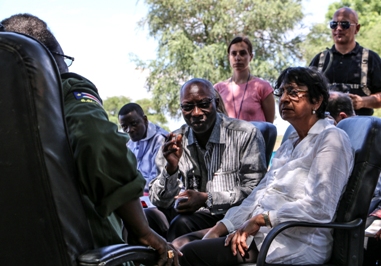UN officials warn against war crimes in South Sudan
April 30, 2014 (JUBA) – Senior UN officials warned on Wednesday against the escalation of atrocities and war crimes committed in the South Sudan since the start of the four-and-a-half month conflict, but were cautious to speak in terms of genocide.

Their visit took place after killing of hundreds of civilians in Bentiu and assault on IDPs sheltering in the UN base in Bor where over 50 people were murdered.
Pillay said they warned the two sides that the investigation carried by the UN teams will also involve the role of political and military leaders and their part of responsibility in the crimes atrocities perpetrated against civilians.
“Mr Dieng and I have warned those same leaders that current and future investigations will inevitably examine the extent to which political and military leaders either knew, should have known, or failed to take all necessary and reasonable measures to prevent war crimes and crimes against humanity committed by themselves or by subordinates under their effective authority and control,” she said.
She stressed that South Sudanese are now facing famine because the ongoing armed conflict prevents farmers from planting, and this will have negative impact on the country’s food supplies.
“If famine does take hold later in the year – and the humanitarian agencies are deeply fearful that it will – responsibility for it will lie squarely with the country’s leaders who agreed to a cessation of hostilities in January and then failed to observe it themselves, while placing all the blame on each other,” Pillay said.
When asked about the probability of genocide in the country, however, Pillay who is the former president of the International Criminal Tribunal for Rwanda, said only judges based on the findings of investigation teams can say that.
“Judges have to look at the facts to see whether there was a specific intent to destroy one of four groups – that is national, ethnic, racial and religious,” she said, referring to the Convention on the Prevention and Punishment of the Crime of Genocide.
Dieng, who is the former registrar of the International Criminal Tribunal for Rwanda also made similar statements,adding that his role is not to determine if there is a genocide in South Sudan.
“My role is only to prevent genocide. That means to monitor and to see where there are risk factors that, if not addressed, could lead to genocide,” he said.
Dieng, of Senegal, nonetheless said that incitement to hatred and killing people based on ethnicity in South Sudan are elements of concern for the international community.
“Believe me, on the accountability issue, the UN secretary-general Ban Ki-moon, is strongly committed and we will make sure that never again what happened in Rwanda happens in another place in this continent,” he said.
(ST)
